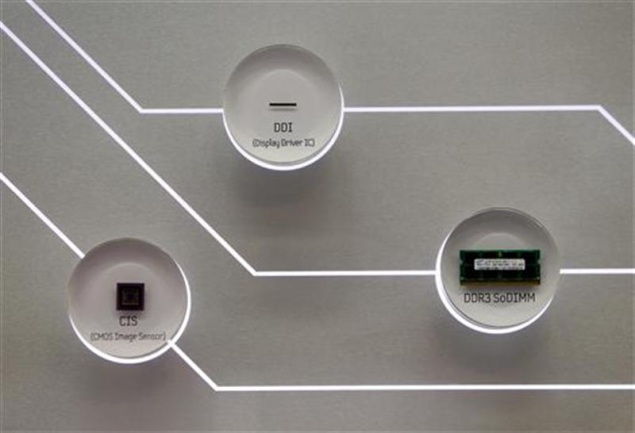- Home
- Laptops
- Laptops News
- South Korea says Samsung chip plant caused cancer
South Korea says Samsung chip plant caused cancer

The Korea Workers' Compensation and Welfare Service, which is part of the labor ministry, ruled earlier this month that there was a "considerable causal relationship" between the woman's cancer and her five years of work at a semiconductor plant near Seoul. The ruling didn't become public until Friday when the agency announced compensation for the woman's family.
Samsung spokesman James Chung said it will not appeal the government's decision. The company is the world's largest maker of computer memory chips.
There have been very few cases in South Korea in which a link between working conditions and cancer has been convincingly demonstrated. Nearly 30 South Koreans have filed claims with the agency that working at Samsung caused rare forms of disease, cancer, multiple sclerosis and brain tumors. Another dozen people whose claims were rejected by the agency have filed court appeals.
The Korea Workers' Compensation and Welfare Service collects insurance fees from companies and makes rulings on whether diseases are caused by workplace hazards. Workers file industrial disease-related claims with the agency, not with their employer. Either party can appeal to the courts.
The woman, whose last name is Kim, died in March, age 36, three years after being diagnosed with breast cancer. Kim worked for Samsung from 1995 to 2000. Her first name was not released at her family's request.
The agency didn't say how much compensation was paid, but spokesman Kang Byung-soo said it usually amounts to nearly four years of a worker's salary.
"There was an exposure to organic solvents and radiation. The earlier the exposure is, the more likely the cancer is caused," the workers compensation agency said in a statement about Kim's case.
It said it also reviewed records from overseas which showed that working night shifts is linked to a higher chance of breast cancer.
Kim, who worked eight to 12 hours a day, was often assigned night time shifts that started at 10 p.m. and ended at 6 in the morning, according to Lee Jong-ran, an official at SHAPRs, or Supporters for the Health And Rights of People in the Semiconductor industry.
Kim worked at a plant without a radiation detector and was exposed to benzene and other carcinogens, according to the activist group.
Lee said the latest decision will have a positive impact on Samsung employees who are hoping to prove a link between their diseases and working conditions at Samsung Electronics.
"Because the government recognized the link, people who have pending lawsuits will feel encouraged," she said.
There have been three recent cases in which authorities recognized that working conditions at Samsung had contributed to diseases.
In April, the agency compensated a former Samsung worker who suffered from aplastic anemia. Last year, a Seoul court ruled that a Samsung semiconductor plant caused the cancer of two former employees. The agency, which had earlier rejected claims from the two workers, is appealing the court's decision.
Catch the latest from the Consumer Electronics Show on Gadgets 360, at our CES 2026 hub.
Related Stories
- Samsung Galaxy Unpacked 2025
- ChatGPT
- Redmi Note 14 Pro+
- iPhone 16
- Apple Vision Pro
- Oneplus 12
- OnePlus Nord CE 3 Lite 5G
- iPhone 13
- Xiaomi 14 Pro
- Oppo Find N3
- Tecno Spark Go (2023)
- Realme V30
- Best Phones Under 25000
- Samsung Galaxy S24 Series
- Cryptocurrency
- iQoo 12
- Samsung Galaxy S24 Ultra
- Giottus
- Samsung Galaxy Z Flip 5
- Apple 'Scary Fast'
- Housefull 5
- GoPro Hero 12 Black Review
- Invincible Season 2
- JioGlass
- HD Ready TV
- Laptop Under 50000
- Smartwatch Under 10000
- Latest Mobile Phones
- Compare Phones
- Tecno Spark Go 3
- iQOO Z11 Turbo
- OPPO A6c
- Samsung Galaxy A07 5G
- Vivo Y500i
- OnePlus Turbo 6V
- OnePlus Turbo 6
- Itel Zeno 20 Max
- Lenovo Yoga Slim 7x (2025)
- Lenovo Yoga Slim 7a
- Lenovo Idea Tab Plus
- Realme Pad 3
- Garmin Quatix 8 Pro
- NoiseFit Pro 6R
- Haier H5E Series
- Acerpure Nitro Z Series 100-inch QLED TV
- Asus ROG Ally
- Nintendo Switch Lite
- Haier 1.6 Ton 5 Star Inverter Split AC (HSU19G-MZAID5BN-INV)
- Haier 1.6 Ton 5 Star Inverter Split AC (HSU19G-MZAIM5BN-INV)
















